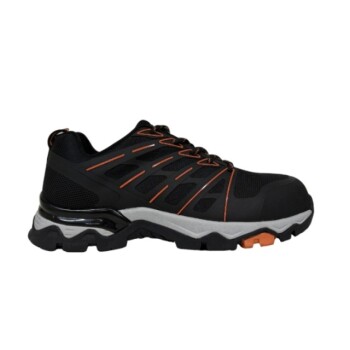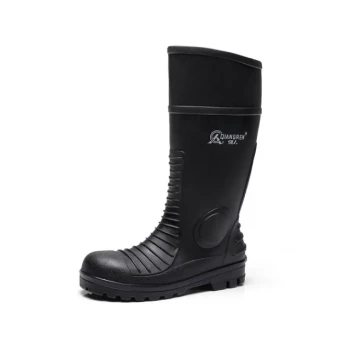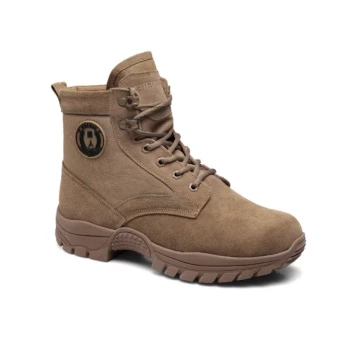Slip-resistant shoes are essential for hazardous jobs because they are specifically engineered with soft rubber outsoles and deep, intricate tread patterns. This design maximizes the friction between the shoe and the floor, creating a powerful grip that significantly reduces the risk of falling on wet, greasy, or otherwise slippery surfaces.
The core function of slip-resistant footwear is not just about having "good grip"—it's a purpose-built safety system that combines material science and physics to prevent the most common types of workplace accidents.
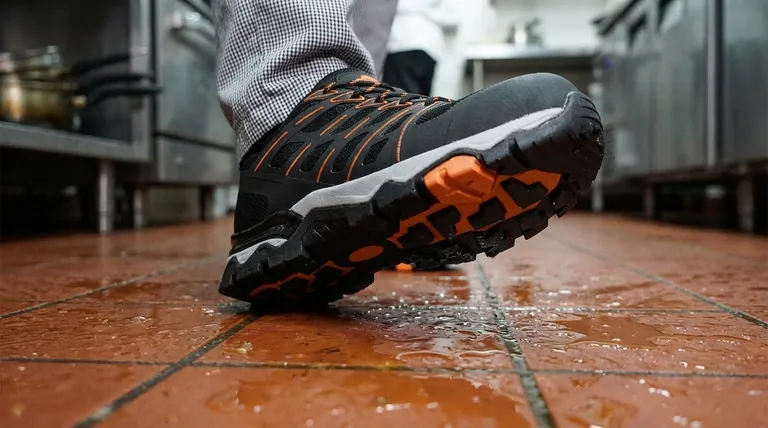
The Science of Grip: How Slip-Resistant Shoes Work
To understand why these shoes are so critical, you need to understand the simple physics behind their design. Their effectiveness comes from a combination of material, pattern, and function.
The Principle of Friction
At its core, slip resistance is about maximizing friction. This is the force that resists motion when two surfaces rub against each other. A slippery floor has very low friction, making it easy to fall.
Slip-resistant shoes are designed to dramatically increase this friction, effectively "sticking" the shoe to the floor surface and providing stability with every step.
Specialized Outsole Materials
The outsole is typically made from a softer rubber compound. Unlike the hard, durable plastic of a standard shoe, this softer material is more pliable and can conform better to microscopic variations in the floor surface, increasing the total contact area.
Advanced Tread Patterns
The pattern of grooves, or treads, on the bottom of the shoe is its most important feature. These treads are not random; they are designed to channel liquids like water, grease, and oil out from under the shoe.
This channeling action prevents a layer of liquid from forming between the sole and the floor—a phenomenon known as hydroplaning—which is a primary cause of slips. By clearing the liquid away, the rubber sole maintains direct contact with the ground.
Beyond Grip: Comprehensive Workplace Protection
While the primary benefit is preventing falls, these shoes offer a multi-layered approach to safety and performance that makes them indispensable in demanding environments.
Reducing Slips, Trips, and Falls
This is the most direct benefit. In industries like food service, healthcare, and manufacturing, floors are frequently wet or contaminated. Proper footwear is the first and most effective line of defense against these common workplace accidents.
Enhancing Productivity Through Comfort
Many jobs requiring this footwear involve standing or walking for 8-12 hours a day. Because of this, slip-resistant shoes often include superior cushioning and arch support to reduce fatigue, prevent pain, and keep employees focused and productive.
Ensuring Regulatory Compliance
For many businesses, providing or mandating slip-resistant footwear is a key part of complying with OSHA (Occupational Safety and Health Administration) safety regulations. Doing so helps prevent injuries and protect the business from liability.
Durability for Demanding Jobs
These shoes are built to withstand harsh conditions. They often feature durable materials that are easy to clean and maintain, a crucial feature in environments like commercial kitchens or industrial factories.
Understanding the Trade-offs
While essential, it's important to have a complete picture. No safety equipment is perfect, and slip-resistant shoes are no exception.
Not a Guarantee Against All Falls
Slip-resistant shoes drastically reduce the risk of falling, but they cannot eliminate it entirely. Extreme contamination, user inattention, or worn-out treads can still lead to accidents.
The Importance of Tread Wear
The effectiveness of a slip-resistant shoe is directly tied to the condition of its tread. As the sole wears down and the grooves become shallow, its ability to channel liquid and create friction diminishes significantly. These shoes have a finite lifespan and must be replaced regularly.
Cost and Style Considerations
High-quality, certified slip-resistant shoes can be more expensive than standard footwear. While a wide variety of styles now exist, the most functional and safest options may prioritize performance over aesthetics.
Making the Right Choice for Your Goal
Selecting the right shoe depends on the specific hazards of your work environment.
- If your primary focus is food service or healthcare: Prioritize shoes with aggressive tread patterns designed for wet and oily surfaces and uppers that are fluid-resistant and easy to sanitize.
- If your primary focus is construction or manufacturing: Look for shoes that combine certified slip resistance with essential protective features like steel toes, puncture-proof soles, and electrical hazard protection.
- If your primary focus is warehouse or delivery work: Choose a shoe that balances strong slip resistance with exceptional cushioning and ankle support to handle long hours on concrete floors and varied terrain.
Ultimately, investing in the correct slip-resistant footwear is a foundational investment in your personal safety and professional endurance.
Summary Table:
| Key Feature | How It Enhances Safety & Performance |
|---|---|
| Soft Rubber Outsoles | Conforms to floor surfaces for maximum friction and grip. |
| Intricate Tread Patterns | Channels water, grease, and oil away to prevent hydroplaning. |
| Superior Cushioning | Reduces fatigue for employees who stand or walk all day. |
| Durable Construction | Withstands harsh conditions in kitchens, factories, and warehouses. |
Protect your team and boost productivity with professional-grade safety footwear from 3515.
As a large-scale manufacturer, we produce a comprehensive range of certified slip-resistant shoes and boots for distributors, brand owners, and bulk clients. Our production capabilities encompass all types of occupational footwear, ensuring durability, comfort, and compliance for food service, industrial, and healthcare environments.
Contact our experts today for a custom footwear solution tailored to your specific safety needs.
Visual Guide
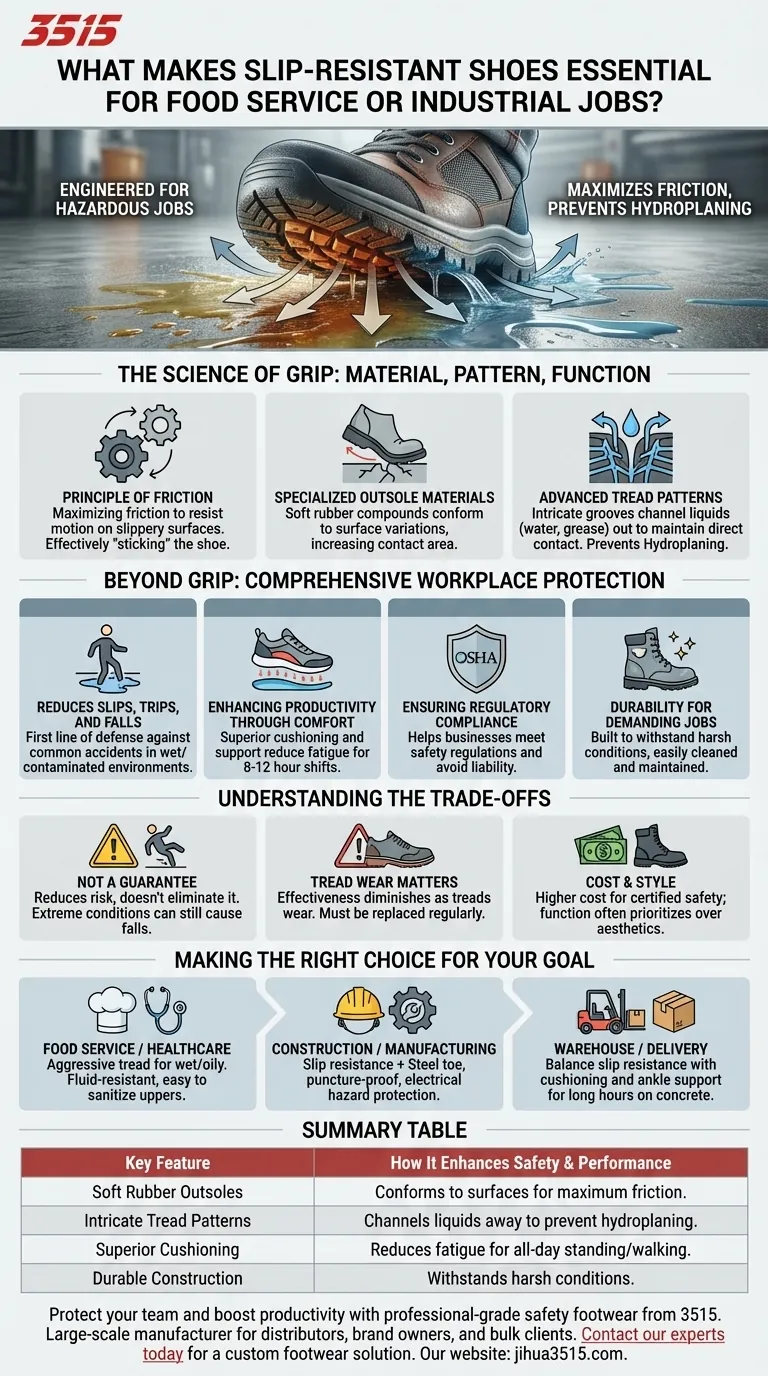
Related Products
- Premium KPU Injection Athletic Style Safety Shoes
- Wholesale Anti-Smash & Puncture-Proof Safety Shoes Custom Manufacturing for Brands
- Customizable Anti-Smash Safety Boots for Wholesale & Private Label Manufacturing
- Custom Wholesale Leather Safety Boots Direct Factory Manufacturing
- Premium Wholesale Waterproof Safety Boots High Performance Protection for Industrial Markets
People Also Ask
- How are boots designed to meet the ASTM protective toe standard? A Guide to Impact & Compression Safety
- Why is expert help recommended when selecting safety shoes? Ensure Perfect Fit & Hazard Protection
- What is the ASTM standard for puncture resistance? A Guide to Selecting the Right Protective Footwear
- What is the importance of ASTM International in safety footwear standards? Ensure OSHA Compliance and Worker Safety
- What is the purpose of puncture-resistant footwear? Protect Your Feet from Sharp Hazards
